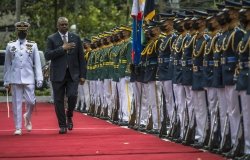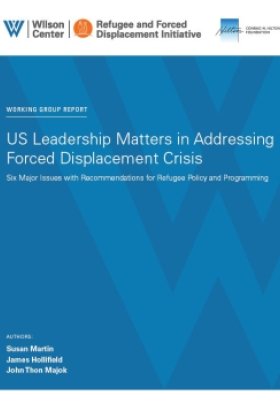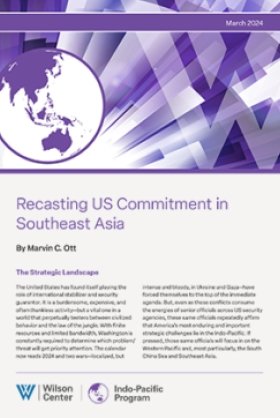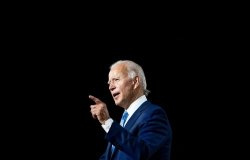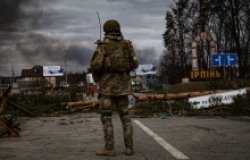Odd Couple or Just at Odds? The Future of U.S. - Turkey Relations
Professor Soli Ozel, Bilgi University (Turkey) and Southeast Europe Policy Scholar
Overview
THE ODD COUPLE OR JUST AT ODDS?
TURKEY, THE US AND AN AFFAIR IN CRISIS
Presentation by Prof. Soli Ozel
(PowerPoint slides on polling available under the See Also section to refer to this presentation.)
Turkish-American relations are on the rocks. Although a long term commonality of interests exists, the two sides are unable to coordinate policy, agree on a common course of action or define the parameters of a new type of relation that will guide them in the 21st century. When all is said and done what poisons the relations, despite long standing ties, is the uncertainties in Iraq and particularly the perceived possibility of an independent Kurdish state in the north. Combined with the Turkish public's conviction that the United States does not do much if anything to eradicate the PKK all attempts at forging the relations anew fall short of their goal. The cumulative effect of small skirmishes, misunderstandings, recriminations and dissatisfactions gradually build an insurmountable obstacle to finding the right course. For Turkey the PKK issue and the possibility of an independent Kurdistan are existential matters for better or worse. Unless the dialogue between the two countries is based on this understanding no amount of vision papers may save the day.
Part of this may stem from what Ian Lesser identifies as the incompatibility of the two sides' priorities or their way of assessing or evaluating the relations. Lesser argues that "it is essential to acknowledge that a strategic relationship conceived essentially in bilateral terms is unsustainable" given the global concerns of the United States. On the other hand a Turkey that sees itself as a "central actor" in the regions that it borders and in global terms is unlikely to adjust all its policies and suppress all its priorities because of American plans or policies that are deemed ill-conceived and even worse executed anyway. Thankfully there are enough sound minds on both sides that reflect on this matter and try to find a way out.
1) In the introduction to a recent report published by the Council on Foreign relation "Generating a new momentum fro a new era in US-TR relations" and written by Steven Cook and Elizabeth Sherman Randall the president of the council Richard Haass wrote the following:
"...it is no longer a foregone conclusion that Turkey will support US policies. The consequences of a rupture in ties between Washington and Ankara or more darkly a Turkey that becomes strategically disoriented would be great. Turkey's strategic importance is greater than ever."
The authors themselves argued strongly that US-TR relations must be repaired and modernized.
2) In a recent German Marshall Fund sponsored survey of Transatlantic Trends the Turks' warmth for the United States has dropped from an already low 28 to 20. The warmth towards Iran has gone up from 34 to 43 in the same period. Whereas only 35 percent of Americans would reconcile themselves to a nuclear Iran 56 percent of Turks say this would be ok. Only 10 percent of Turks look favorably to a war against Iran. Only 7 percent of Turks support President Bush's policies (the lowest in the survey) and those who don't are at 81 percent. Fully 56 percent of Turks believe American leadership is totally undesirable. Most surprisingly and further reason for concern is the level of support for NATO traditionally a relation taken for granted by Turks.. Whereas in 2004 53 percent of Turks thought NATO essential for Turkey's security and 52 percent did so in 2005 the figure dropped to 44 percent this year. There are other figures that actually support these findings. In fact there is a secular decline in the support given to Turkey-US relations since 1999. Here is a graphic illustration of this fact.
3) This is the public opinion level. Increasingly the public's views are important and in some sense these also reflect the inclination of the elites. Several factors help account for this dire picture. Throughout the 1990s the public witnessed ethnic cleansing in Bosnia and in Kosovo, a brutal suppression of the Chechen uprising and of course it all began with the first Gulf War. For many if not most Turks this was not a way to defeat aggression but an attempt to punish a Muslim country that dared defy the United States. The current war against Iraq and the possibility of one against Iran are judged in similar fashion. That it was the Us that ended the Bosnia War and saved the Kosovar Albanians was lost in the black hole of collective memory. The environment of the post-Cold War period, the massive migration, the rise of identity politics and most importantly the advent of a counterelite that did not share the establishment's views on the West or relations with the West undoubtedly played their part in this outcome.
4) At the establishment level as well, perceptions and positions changed particularly as Turkey's EU bid became more serious and democratization threatened the long term custodians of power in Turkey that were already being challenged by the economic ascent of the mostly Islamist counterelite. But the process itself was gradual. For Turkish-American relations the 1990s after a weak start turned out to be a close and mutually beneficial one. The commonality of security interests that tied the two countries together disappeared at the end of the cold war and the demise of the Soviet Union. Still Turkey's profile rose as the United States saw in Turkey the new front line state of the post-cold war era and relations moved in the right direction even if with some tension throughout the Clinton years. It was obvious that Turkey acquired a different kind of importance because of what she is as much as for where she is. Or the combination gave it the status it enjoyed.
5) Turkey had other interests and these were mostly supported by the United States as well. Washington gave strong support to the Baku-Ceyhan pipeline that turned Turkey into an energy corridor. Relations with Israel were enthusiastically supported by Washington.
6) Domestically Turkey changed though and this change affected not just the public but part of the established elites as well. Both parties turned increasingly to vitriolic anti-Western and nationalist discourse. Identity politics proved to be more and more important and the Islamist movement took advantage of the utter failure of secular parties throughout the 1990s. Therefore Turkey witnessed with the elections of 2002 a doubly interesting phenomenon. On the one hand we had Islamists taking the country towards the European Union and therefore liberalizing the polity and expanding the space for fundamental freedoms. On the other hand a different elite were coming to replace the established pro-western elite that also started to find itself in both an identity crisis of sorts and in an existential crisis engendered by the Kurdish question.
7) Turkish public opinion became during that decade a force to be reckoned with. Foreign policy by the end of the 1990s was not the exclusive domain of the country's elite and it became more and more problematic to conduct foreign policy over the head of the public.
8) But the problems in bilateral relations cannot just be dropped on the lap of public opinion. At the elite level as well relations with the West in general started to receive a more critical and for some highly antagonistic approach. The climax of this tension and the most succinct formulation of the established elite's more nationalistic and regressive outlook came from the then secretary General of the National Security Council General Tuncer Kilinc. Kilinc proposed that Turkey stop the EU process and engage in closer relations with Iran and Russia without neglecting the United States. Following September 11 most of the targets that the United States identified turned out to be in the vicinity of Turkey and actually were its neighbors. The war against Iraq in that sense brought to the surface all the tensions suppressed over the course of the 1990s and turned both the elites and the public against the United States. The governing JDP had an uneasy relation with the US. On the one hand it feared Washington's influence in Turkish politics and was weary of someone pulling the plug on them. On the other hand both their world view and their view of Turkey as a central actor in global politics led them to positions conflicting with those of the US. Yet they were not acting on their own. On Iran and Syria there was more to Turkish policy than just JDP's Islamist inclinations or solidarity with Muslim powers. The policy for both countries were and are state policies to which the JDP adds the occasional ideological or Muslim solidarity dimension as in the visit of Halid Mashal earlier this year.
9) For me a decisive moment was a speech given by the then Chief of the General Staff Hilmi Ozkok on the 20th of April. At a time when Turkish-American relations appeared to be going down as a result of comments and actions by the JDP government, Ozkok reiterated that relations with the United States were Turkey's primary strategic relations. Ten days later the Prime Minister repeated the same message almost verbatim. ON the American side there was also much effort to keep the relations afloat. This was particularly the conscious choice of Secretary of State Rice. A lot will hinge now on the efforts of the co-coordinators Joseph Ralston and Edip Baser on finding the proper course of action against the PKK.
Documents & Downloads
Hosted By

Global Europe Program
The Global Europe Program is focused on Europe’s capabilities, and how it engages on critical global issues. We investigate European approaches to critical global issues. We examine Europe’s relations with Russia and Eurasia, China and the Indo-Pacific, the Middle East and Africa. Our initiatives include “Ukraine in Europe” – an examination of what it will take to make Ukraine’s European future a reality. But we also examine the role of NATO, the European Union and the OSCE, Europe’s energy security, transatlantic trade disputes, and challenges to democracy. The Global Europe Program’s staff, scholars-in-residence, and Global Fellows participate in seminars, policy study groups, and international conferences to provide analytical recommendations to policy makers and the media. Read more
Thank you for your interest in this event. Please send any feedback or questions to our Events staff.

